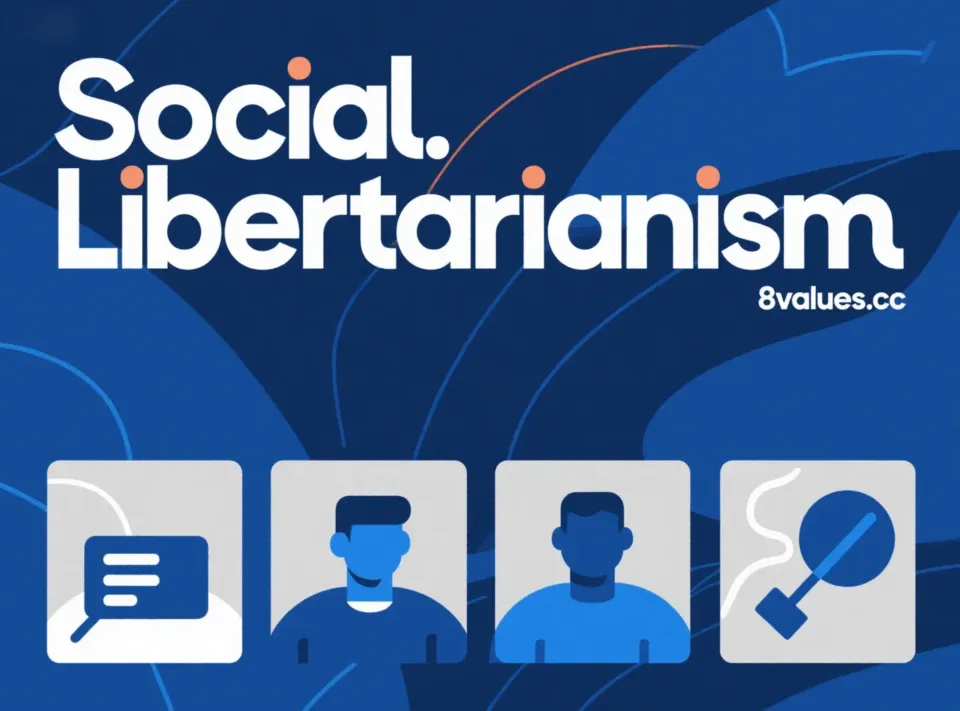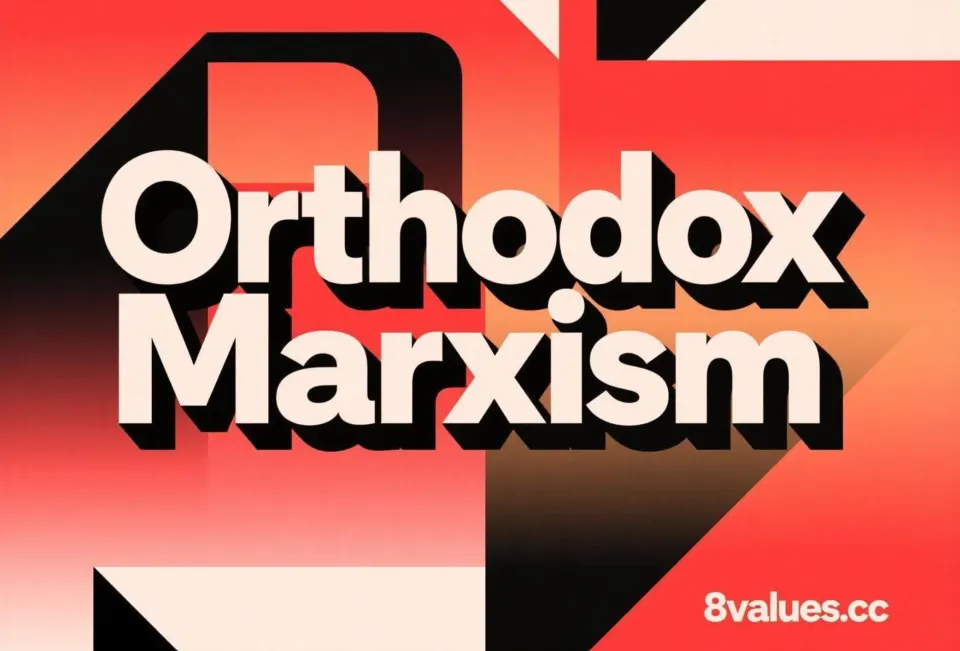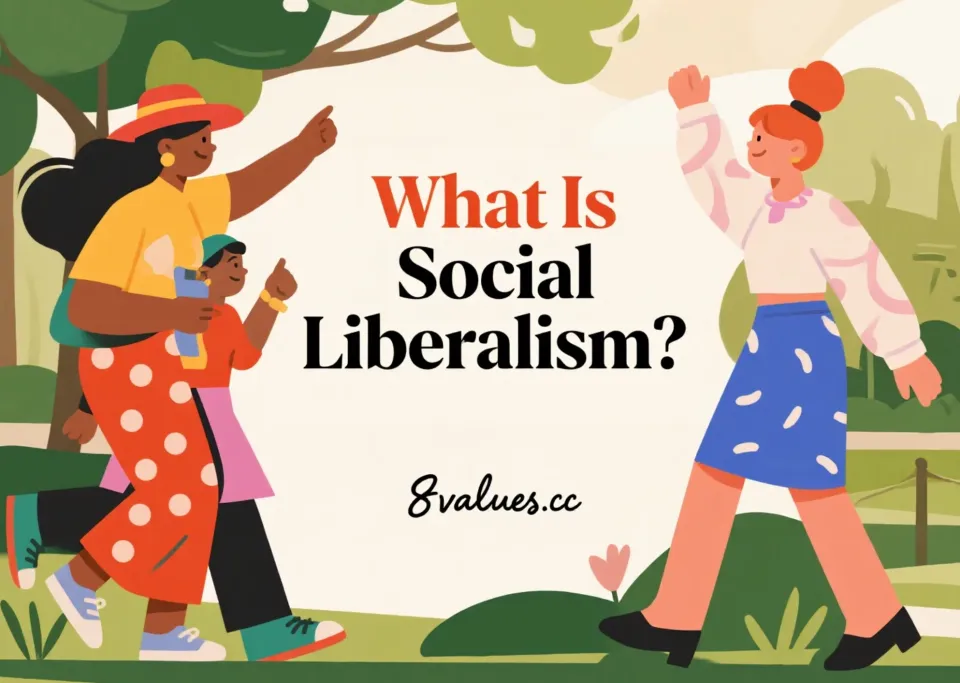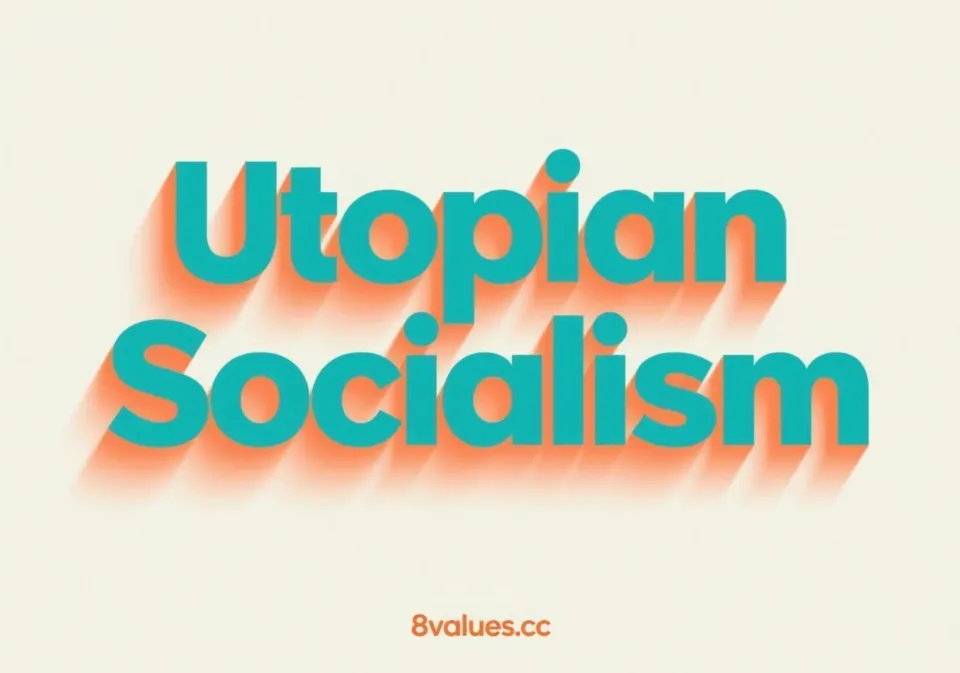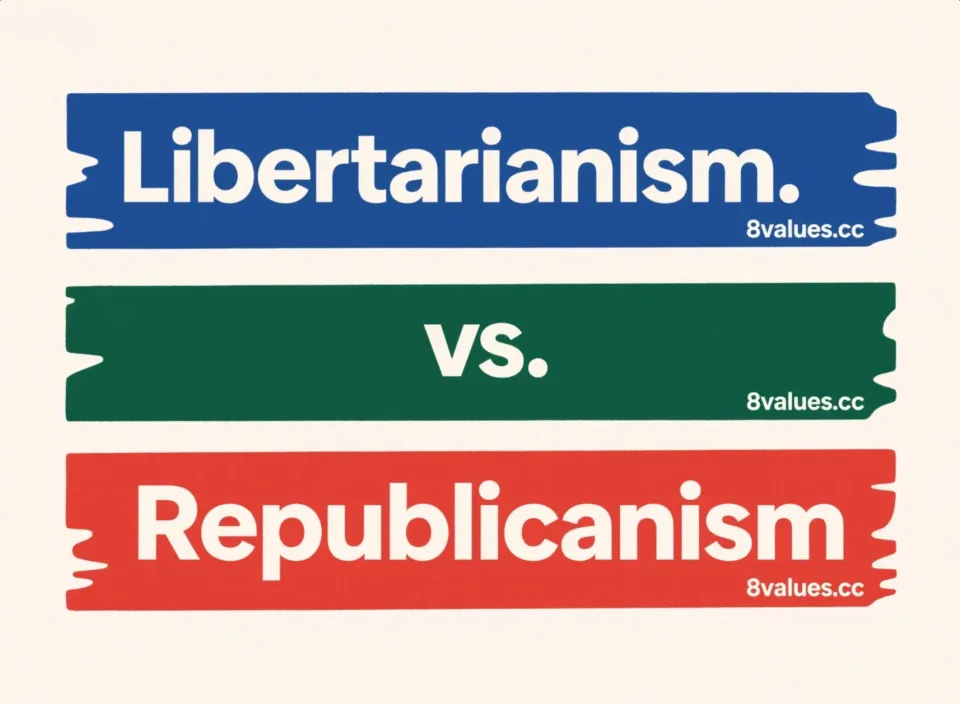Libertariano social | 8Values Interpretação da ideologia ideológica de testes políticos
O libertarianismo social é uma filosofia política única que combina um firme compromisso com a liberdade individual com uma preocupação com a equidade social e a igualdade de oportunidades. Este artigo explorará sua filosofia central, proposições de políticas, diferenças de outras ideologias e desafios enfrentados para ajudá -lo a entender essa idéia política de maneira mais abrangente. Quer saber quão perto suas tendências políticas estão do liberalismo social? Clique para participar dos 8 valores de teste ideológico político!
O libertarianismo social, como um ramo único da filosofia política contemporânea, está comprometida em encontrar um equilíbrio entre maximização da liberdade individual e justiça social e justiça . Ele herda a adesão do liberalismo tradicional ao "pequeno governo" e "supremacia dos direitos individuais", enquanto absorve a preocupação do progressivo sobre os direitos e as oportunidades iguais de grupos desfavorecidos na sociedade. Ao contrário do liberalismo de direita que se concentra mais na liberdade econômica, o liberalismo social enfatiza a liberdade na "dimensão social", isto é, eliminando restrições à liberdade individual de forças não-governamentais (como capital monopolista, opressão cultural, discriminação sistêmica).
O conceito central e fundamento filosófico do liberalismo social
A lógica central do liberalismo social reside em "opondo-se a todas as formas de opressão, seja a coerção do estado ou a não-coercção da estrutura social". Seus principais defensores giram em torno dos três pilares de "liberdade individual", "igualdade social" e "governo limitado", e enfatiza instituições fortes com ênfase especial.
Liberdade pessoal: a integração de liberdade positiva e liberdade negativa
O entendimento do liberalismo social sobre a "liberdade" transcende a pura "liberdade negativa" do liberalismo tradicional (isto é, "liberdade da interferência com os outros", como isento do escrutínio do governo e isento da tributação forçada) e, ao mesmo tempo, absorve algumas das conotações da "liberdade positiva" (isto é, "liberdade de auto-resistência", como acesso à educação e assistência médica.
- Defenda a liberdade de estilo de vida pessoal : essa idéia defende firmemente a liberdade absoluta dos indivíduos na esfera privada, como apoiar o direito ao aborto, legalização do casamento entre pessoas do mesmo sexo, descriminalização dos medicamentos (ou legalização) e descriminalização do trabalho sexual. Ele acredita que o governo não tem o direito de interferir em escolhas individuais com base na "moralidade pública".
- Apoiando a igualdade de competência : os libertários sociais acreditam que simplesmente "liberdade formal" (como todos iguais à lei) não é suficiente para garantir a verdadeira liberdade. Eles argumentam que a necessidade de eliminar "barreiras estruturais" que dificultam o desenvolvimento pessoal, como discriminação racial, lacunas salariais de gênero e falta de recursos educacionais causados pela pobreza, porque essas barreiras levarão a alguns grupos "embora tenham o nome da liberdade, mas não a realidade da liberdade". Eles acreditam que quando a própria sociedade se torna um opressor, seus meios de opressão vão além das ações do governo, penetram nos detalhes da vida e escravizam a própria alma.
Igualdade social: profunda igualdade de oportunidade e não igualdade de resultados
Ao contrário de alguns pensamentos socialistas que buscam "igualdade de resultados" (como redistribuição de riqueza para a média), o liberalismo social defende a "profunda igualdade de oportunidade".
- Opor -se ao privilégio herdado : essa idéia acredita que as oportunidades de desenvolvimento individual não devem ser determinadas pela origem (como riqueza familiar, raça e gênero). Os advogados da TI eliminando a "injustiça do ponto de partida" por meio de políticas, como promover o equilíbrio dos recursos educacionais públicos e apoiar o imposto sobre herança (restringir o monopólio do oportunidade causado pela transmissão intergeracional da riqueza).
- Recusa em aplicar a igualdade : os liberalistas sociais discordam de que o governo alcance a igualdade "privando o forte da riqueza", acreditando que isso infringiria os direitos de propriedade pessoal. Eles tendem a dar a todos um ponto de partida para uma concorrência justa ao "eliminar o monopólio", "promover a concorrência" e "fornecer serviços públicos básicos" (como educação básica gratuita, assistência médica universal).
Governo limitado e cheques e saldos
A atitude do liberalismo social em relação ao governo é "instrumental", e o objetivo do governo existe de "proteger a liberdade individual" em vez de "dominar a sociedade ou a economia". Ele procura equilibrar a liberdade positiva com liberdade negativa, imaginando uma sociedade com governos menores, mas fornecendo benefícios, assistência médica gratuita e alguma regulamentação.
- As funções necessárias do governo : incluem proteger os direitos básicos individuais (direito à vida, direitos de propriedade, liberdade de expressão, liberdade de associação) e reprimir a violência, fraude, monopólio e outros atos que infringem a liberdade dos outros. Também pode fornecer “bens públicos” como defesa, saúde pública, educação básica e especialmente educação para os pobres, pois esses serviços são vistos como base para os indivíduos alcançarem a liberdade. Além disso, o governo também deve corrigir a "opressão estrutural", como através de leis anti-discriminação, proibindo empregadores e escolas de discriminar outros por raça, gênero e orientação sexual e eliminar a injustiça sistêmica.
- Funções proibidas do governo : O liberalismo social se opõe à intervenção do governo em vidas privadas pessoais (como restringir o aborto, censurar a fala) e intervenção excessiva na economia (como políticas industriais dominantes, altas taxas de imposto, protecionismo comercial).
- Vigilância contra o poder : essa idéia não é apenas vigilante contra o poder do Estado, mas também estende a fonte de "opressão de poder" à estrutura social, se opõe ao "monopólio de capital opressão" (como gigantes da tecnologia e grupos de monopólio de energia restringem a liberdade pessoal ao controlar informações, manipular o mercado e explorar trabalhadores) e apoiar o governo na realização de "anti-mono-monopolia. Ao mesmo tempo, também critica a "opressão cultural e de identidade" como "patriarcado", "racismo" e "cultura da homofobia" na sociedade tradicional, e advogados eliminando essa opressão por meio do progresso conceitual social e anti-discriminação legal.
As semelhanças e semelhanças entre liberalismo social e outros pensamentos políticos
Para entender melhor o libertarianismo social, é necessário compará -lo com outras grandes ideologias.
A comparação entre libertarianismo social e libertarianismo
- Pontos comuns : ambos atribuem grande importância à liberdade pessoal, enfatizam a auto-propriedade e se opõem à intervenção excessiva do governo.
- Diferenças -chave : O liberalismo tradicional enfatiza mais liberdade econômica e responsabilidade pessoal e pode ser conservadora ou neutra em questões sociais. O liberalismo social, embora mais aberto a questões sociais, apoia as escolhas livres dos indivíduos em campos culturais e sociais e reconhece que a desigualdade estrutural pode limitar a igualdade de oportunidade. Alguns comentários acreditam que os libealistas puros levam a filosofia de "viver e deixar viver" ao extremo e defendem "todos são para si".
Leituras relacionadas: 8 Valores Todos os resultados: Libertarianismo
A comparação entre libertismo social e liberalismo social
O liberalismo social e o libertarianismo social tomam "liberdade" como seu valor central, mas há diferenças significativas na definição de "liberdade", o posicionamento dos papéis do governo e o equilíbrio entre direitos individuais e justiça social.
- Definição de "liberdade" : o liberalismo social defende "a liberdade substantiva" prioridade, acreditando que a liberdade é a combinação de liberdade positiva e liberdade negativa. O governo precisa eliminar as barreiras estruturais por meio de políticas públicas para que todos possam desfrutar da base material da liberdade igualmente. O liberalismo social, no núcleo, concentra -se em "pura liberdade negativa", enfatiza "livre de toda coerção involuntária" e acredita que a tributação forçada do governo para o bem -estar é uma destruição de liberdade.
- Papel do governo : o liberalismo social considera o governo como um "empoderador" e um "balanceador", e alcança a liberdade universal através da intervenção e garante a equidade social; apoia impostos progressistas e o governo para fornecer serviços públicos universais. O liberalismo social posiciona o governo como um "observador noturno", que é responsável apenas por proteger a vida pessoal, a propriedade e a liberdade de contrato, se opõe aos impostos progressistas e à prestação do governo de serviços públicos e defende soluções orientadas para o mercado.
- Atitude em relação à "justiça social" : o liberalismo social acredita que "a justiça é o pré -requisito pela liberdade" e o governo tem a responsabilidade de corrigir ativamente a injustiça por meio de políticas de redistribuição e direitos iguais. O liberalismo social acredita que "a justiça é o resultado da liberdade, não do objetivo", e perseguir à força a justiça do resultado prejudicará a justiça do processo.
Leituras relacionadas: 8 valores todos os resultados: Liberalismo social
Comparação entre libertarianismo social e socialismo libertário
Esses são dois conceitos que geralmente são confusos, mas na verdade são fundamentalmente diferentes.
- Fundação Econômica : O socialismo liberal rejeita explicitamente o capitalismo, a propriedade privada e as formas de commodities . Ele defende a propriedade pública ou cooperativa e o gerenciamento de meios de produção. Embora o liberalismo social também se concentre na equidade econômica, ele geralmente aceita uma economia de mercado e apóia a intervenção e a regulamentação social limitadas dentro da estrutura do mercado.
- Papel do Estado : O socialismo liberal está comprometido em abolir o estado ou limitar bastante seu poder. O liberalismo social defende o governo limitado , mas aceita as funções necessárias do governo para proteger os direitos individuais, prestar serviços públicos básicos e antitruste.
- Preocupação central : o socialismo liberal considera a propriedade privada como uma barreira à liberdade. O liberalismo social se concentra mais em garantir que, dentro do sistema capitalista, os indivíduos sejam protegidos da opressão por governos e grandes estruturas sociais.
Leituras relacionadas: 8 valores todos os resultados: socialismo libertário
Comparação entre libertarianismo social e social -democracia
- Grau de Intervenção do Governo : A social-democracia geralmente defende a intervenção governamental ativa para alcançar a equidade social e o bem-estar coletivo por meio de altos impostos e bem-estar social generalizado. Embora o liberalismo social apoie certas redes de seguridade social, ele tem restrições estritas sobre a extensão da intervenção do governo e prefere mecanismos de mercado e colaboração voluntária.
- Sistema econômico : a social -democracia tende a uma economia mista, mas o governo desempenha um papel mais dominante nela. O liberalismo social enfatiza uma economia de livre mercado e, mesmo que exista uma rede de previdência social, é alcançada principalmente por meio de mecanismos favoráveis ao mercado (como a renda básica universal).
Leituras relacionadas: 8 valores todos os resultados: Social -democracia
Proposições políticas e aplicações práticas do liberalismo social
A proposição política do liberalismo social reflete suas características de buscar um equilíbrio entre liberdade individual e equidade social.
Área econômica: mercados livres e intervenção limitada
- Opor a intervenção excessiva do governo : os liberais sociais geralmente apóiam a economia de mercado livre, advogando reduzindo a intervenção do governo na economia, abolindo as barreiras comerciais, a lei dos salários mínimos etc. e apoiar o livre comércio completo. No entanto, eles também reconhecem que o mercado pode falhar e, portanto, aceita regulamentação limitada em alguns aspectos, como antitruste para impedir a formação de "estados" privados.
- Rede de Segurança Social : Ao contrário do liberalismo tradicional, o liberalismo social aceita certas políticas de bem -estar social para garantir condições básicas de vida, como a renda básica universal (UBI), habitação pública e oportunidades iguais de educação. Mas esses mecanismos são frequentemente projetados para serem adequados ao mercado, evitando altos impostos e redistribuição forçada. Por exemplo, a renda básica universal é vista como uma maneira de equilibrar a economia de mercado com redes de segurança social.
- Direitos de propriedade e meio ambiente : essa idéia apóia a privatização de recursos naturais (como fontes de terra e água) e acredita que os direitos de propriedade privada podem proteger o meio ambiente de maneira mais eficaz (ambientalismo de mercado livre). Enquanto isso, os libertários sociais tendem a defender restrições ambientais porque não veem os recursos naturais como produtos privados que podem ser consumidos de forma desregulada.
Campos sociais e legais: liberdade pessoal absoluta e proteção de direitos
- Legalização do crime livre de vítimas : os libertários sociais apóiam a descriminalização de atos não agressivos, como drogas e comércio sexual. Eles acreditam que os adultos têm o direito de decidir que substâncias consomem e que as restrições do governo às drogas são uma violação da autonomia do corpo.
- LGBTQ+ Direitos e Liberdade de Casamento : Apoie fortemente a igualdade no casamento, a igualdade de gênero e os direitos LGBTQ+. Eles se opõem à definição de casamento ou estrutura familiar do governo, apoiam a definição de casamento multilateral por meio de relacionamentos contratuais, etc.
- Liberdade de expressão e direitos digitais : essa idéia enfatiza particularmente o absoluto da liberdade de expressão e apóia novos tipos de liberdade pessoal na era digital, como liberdade de rede, direitos de privacidade e direitos digitais.
- Sistema Legal : tende ao direito comum, que é considerado mais flexível e menos autoritário do que a lei escrita.
Estrutura de governança: descentralização, cheques e contrapesos e aprofundamento da democracia
O liberalismo social defende dispersando o poder de tomada de decisão aos níveis locais e individuais, a oposição à burocracia oligárquica centralizada.
- Descentralização e cheques e saldos : essa idéia combina o conceito de "restrição de poder" do liberalismo clássico com os requisitos de "participação democrática" do liberalismo social. Ele enfatiza a diversidade de descentralização do poder, incluindo a separação do poder legislativo, administrativo e judicial, a descentralização entre os governos central e local e a supervisão do poder público através da sociedade civil, mídia, organizações não-governamentais (ONGs) e outras forças não estatais.
- Aprofundando a democracia : essa idéia apoia melhorar a democracia e torná -la mais direta, mas, ao mesmo tempo, também deve ter restrições para prevenir a "maior tirania". Por exemplo, eles propõem que os governos estaduais possam receber maior poder por meio de disposições constitucionais e, mesmo em alguns casos, a legislação federal pode ser rejeitada.
- Anticorrupção e prestação de contas : eles defendem a melhoria da transparência e responsabilidade do governo por meio de reformas para garantir que o governo sirva os interesses do povo, não os interesses da elite ou indústrias específicas.
Assuntos Internacionais: Não Intervenção e Livre Comércio
A posição do liberalismo social nos assuntos internacionais integra os princípios centrais do liberalismo com a visão internacional do liberalismo social.
- Princípio da não interferência e neutralismo : se opõe à intervenção do governo nos assuntos internos de outros países por força ou coerção econômica e acredita que os conflitos internacionais devem ser resolvidos por meio de consulta voluntária, a menos que a agressão direta esteja envolvida. Eles apóiam uma política neutra permanente semelhante à Suíça, acreditando que o Estado não tem o direito de envolver pessoas em conflitos internacionais irrelevantes.
- Livre mercado e globalização : os advogados abertos mercados internacionais, se opõem ao protecionismo e acredita que o livre comércio pode promover a paz e a prosperidade.
- Criticando a ordem hegemônica : questionar a "ordem internacional liberal" dominada pelos Estados Unidos é essencialmente uma ferramenta hegemônica, acreditando que suprime a autonomia de outros países por meio do poder institucional. Eles apóiam a diversidade cultural e se opõem à exportação forçada de "democratização" ou "intervenção de direitos humanos" com os valores ocidentais.
Escolas internas e figuras importantes do liberalismo social
Embora o libertarianismo social não seja um termo padrão amplamente usado, ele abrange vários subgêneros, como o libertarismo esquerdo.
Gênero principal
- Libertarianismo de esquerda : esta é a escola de pensamento que o "libertarianismo social" provavelmente apontará. Combina ênfase do liberalismo na liberdade individual e direitos de propriedade, bem como a atenção da esquerda à igualdade econômica e à justiça social. Suas perspectivas centrais incluem uma visão crítica da propriedade privada (de que os recursos naturais devem ser a herança comum de toda a humanidade), apoiando um ponto de partida mais equitativo através de impostos (como impostos sobre preços da terra) ou renda básica e o monopólio do estado oposto e o poder empresarial em larga escala.
- Minarquismo : um estado que aceita o nível mínimo (como a polícia, a justiça). O liberalismo social geralmente não defende a abolição completa do Estado, mas um governo muito pequeno cujas tarefas são limitadas a proteger os direitos individuais e manter a ordem legal, e pode fornecer alguns serviços públicos básicos.
Um pensador de longo alcance
As origens ideológicas do liberalismo social podem ser rastreadas até a era do Iluminismo e foram desenvolvidas ainda mais por pensadores modernos.
- John Locke : Sua teoria dos direitos naturais (vida, liberdade, propriedade) e teoria do governo lançaram a base para a liberdade pessoal e o governo limitado.
- John Stuart Mill : propõe o "princípio de dano", enfatizando que os indivíduos desfrutam da soberania dentro do escopo de seu não prejudicial dos outros e são cautelosos com "a tirania da maioria".
- Isaiah Berlin : distingue "liberdade positiva" e "liberdade negativa", o que influencia profundamente o entendimento da liberdade pelo liberalismo social.
- Robert Nozick : A teoria do menor estado defendida em anarquia, estado e utopia fornece uma base filosófica para o governo limitado.
- Philippe Van Parijs , Hillel Steiner , Peter Valentyne : Esses estudiosos contemporâneos são representantes do liberalismo de esquerda, defendendo a redução da pobreza por meios não compulsórios, como renda básica e apoiando a distribuição igual de recursos naturais.
- Andrew Yang : Como uma figura proeminente na política americana, ele defende a renda básica universal e é considerada por alguns como praticante do conceito de liberalismo social.
Desafios e críticas ao liberalismo social
O libertarianismo social enfrenta muitos desafios e críticas na teoria e na prática.
Tensão dentro da teoria
- O equilíbrio da liberdade e da igualdade : os críticos acreditam que o liberalismo social tem uma contradição inerente entre liberdade econômica e igualdade social. Por exemplo, os mercados livres podem exacerbar a desigualdade, enquanto os liberais sociais podem subestimar o papel do governo no tratamento dessas questões. Como alcançar a justiça social sem danificar a liberdade pessoal é o desafio principal que a teoria enfrenta.
- A fronteira das funções necessárias do governo : o liberalismo social defende que o governo presta serviços públicos básicos, mas essa alegação é criticada pelo liberalismo de direita, que acredita que o governo presta serviços públicos inevitavelmente leva a um aumento do tributação, que é essencialmente "a privação forçada de propriedade pessoal" e viola os princípios principais do liberalismo.
- A fronteira entre antitruste e liberdade econômica : essa idéia apóia o "anti-monopólio" do governo, mas se opõe à "interferência do governo nas operações comerciais", que é difícil definir a fronteira na prática. Como distinguir entre "as vantagens formadas pela concorrência racional" e "monopólio que danifica a liberdade", o Willism Liberal Social ainda não propôs um padrão operacional unificado.
Desafios na prática
- Marginalização na política convencional : embora a idéia de liberalismo social tenha um apelo trans-ideológico, na política real, geralmente está na posição marginal de "sem agradar à esquerda e à direita". Pelo direito, suas políticas sociais (como apoiar o direito ao aborto, a descriminalização dos medicamentos e as leis anti-discriminação) são consideradas "excessivamente radicais"; À esquerda, sua oposição a altos impostos e redistribuição de riqueza em larga escala é considerada "manter o sistema capitalista" e não busca a igualdade minuciosamente. Portanto, é difícil se tornar a ideologia dominante entre os principais partidos políticos na maioria dos países.
- Conflito entre eficiência e cheques e saldos : a descentralização excessiva pode levar a uma lenta tomada de decisão e afetar a eficiência do governo.
- Risco de tirania da maioria : Apesar dos mecanismos de cheques e contrapesos, os procedimentos democráticos ainda podem suprimir as liberdades minoritárias e precisam ser remediadas por mecanismos como a independência judicial.
Conclusão: o valor e o futuro do liberalismo social
O valor central do libertarianismo social é que ele quebra a percepção tradicional de "liberdade e igualdade" e propõe a possibilidade de combinar " liberdade livre sem opressão " com " igualdade não coercitiva ". Ele fornece uma perspectiva única para a sociedade contemporânea resolver problemas como a lacuna entre os ricos e os pobres, a discriminação de identidade e a intervenção excessiva do governo, evita o risco de liberalismo de direita "a liberdade limitada leva à divisão social" e também evita as desvantagens do radicalismo de esquerda "sacrificar a liberdade individual sobre a igualdade".
Apesar de muitos desafios práticos e controvérsias teóricas, a idéia do liberalismo social continua a influenciar a política convencional. Por exemplo, o reconhecimento global dos direitos LGBTQ+, a supervisão do monopólio da tecnologia e a ênfase na educação universal refletem a projeção realista de seu conceito até certo ponto. À medida que as preocupações da sociedade sobre a "injustiça estrutural" e a "diversificação dos direitos individuais" crescem cada vez mais, espera -se que o liberalismo social forneça orientações perspicazes para a construção de uma sociedade mais liberal, justa e inclusiva.
Se você está curioso sobre suas tendências políticas ou deseja explorar ainda mais ideologias diferentes, seja bem -vindo a experimentar o teste de tendência política dos 8 valores para aprender sobre sua posição específica sobre as dimensões econômicas, sociais, diplomáticas e governamentais! Além disso, você pode encontrar mais artigos sobre teoria política e suas aplicações na vida real em nosso blog .
